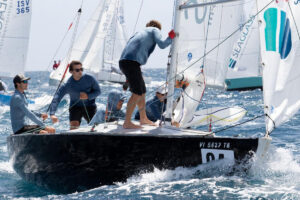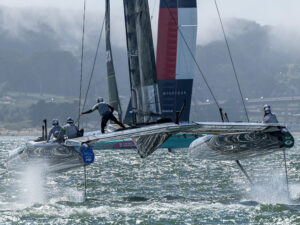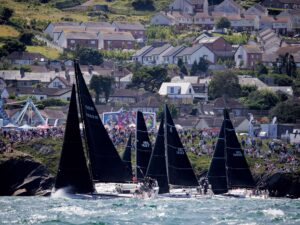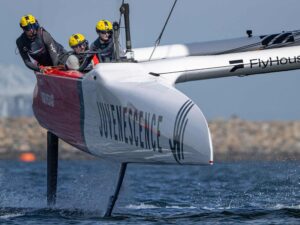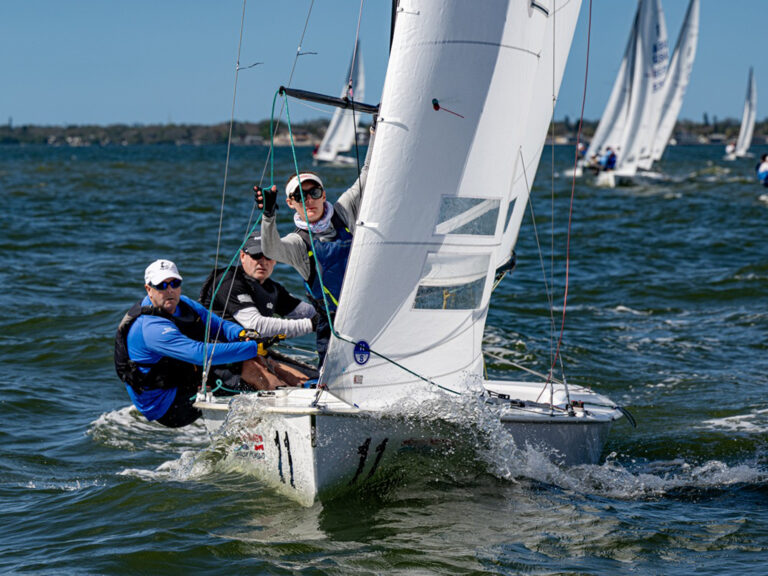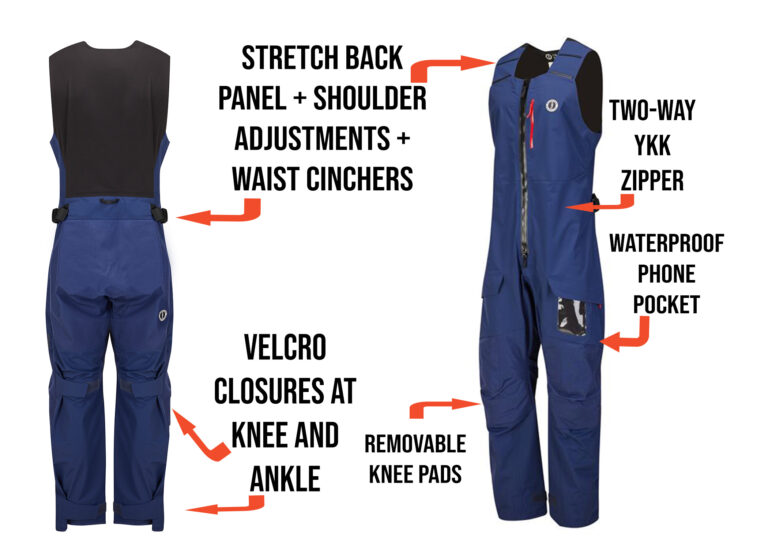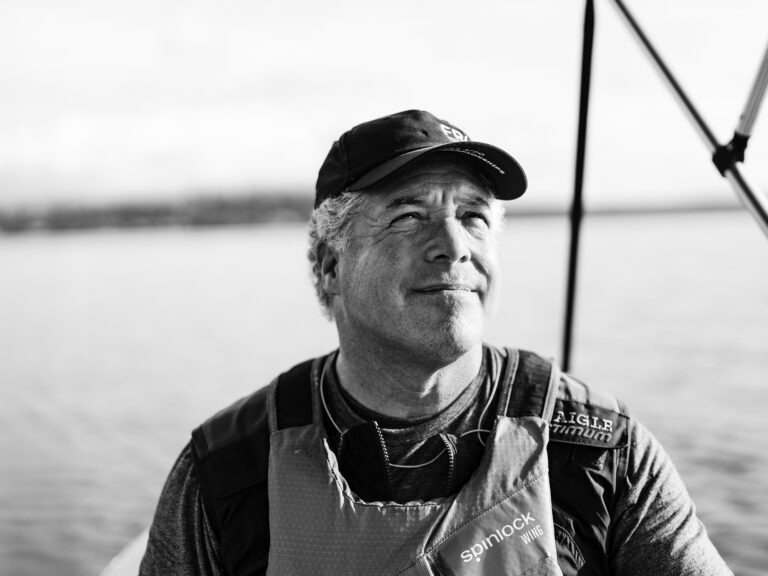Few grandchildren can boast that their grandfather won not one but two Olympic sailing medals. Seventeen-year-old Harry Melges IV is one of those. His grandfather, 88-year-old Harry Melges II, more widely known as Buddy Melges, has a bronze and a gold medal to his credit, along with a slew of wins in other big-league championships. And Harry IV is a chip off the old block, already dominating a number of scow classes and recently winning the Melges 14 National Championship. Young Harry and his crew, Wisconsinite Finn Rowe, have jumped into the 49er class, and while it’s very early on in their campaign, the clear goal is to match his grandfather’s achievement.
At the Lake Geneva Yacht Club on a mid‑June afternoon, Buddy is dressed in his usual khaki pants and nondescript polo shirt. Harry’s white T-shirt says “Melges‑Rowe” in bold black block print.
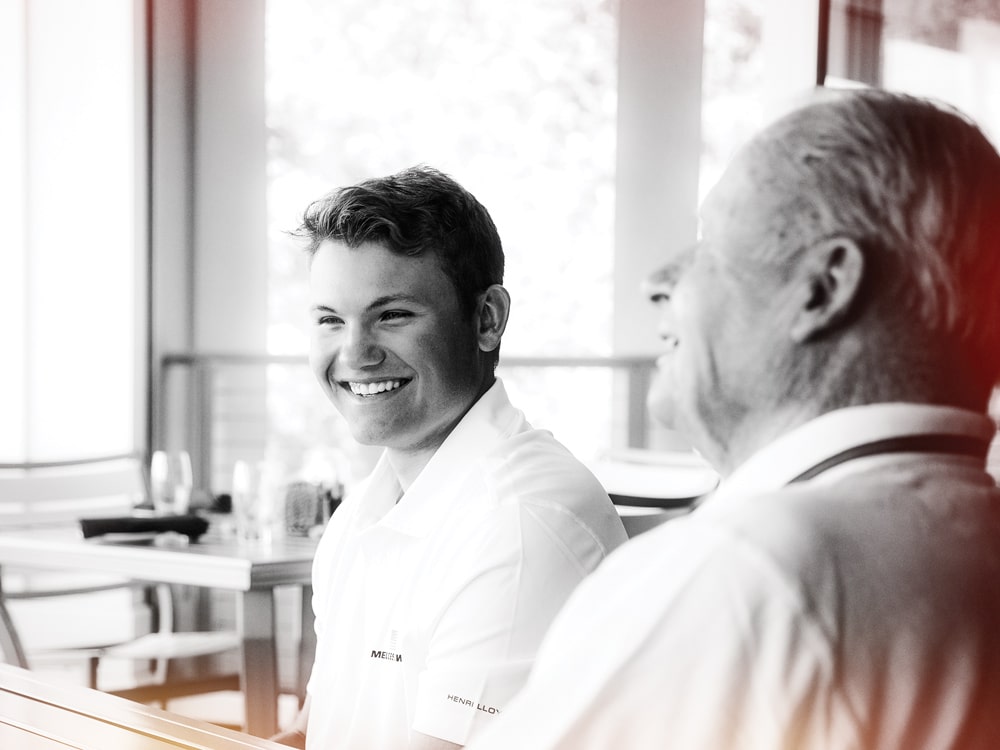
Buddy: Nice shirt! It’s fun to see what you and Finn are accomplishing. Those boats you’re sailing now, by God, it’s a little, narrow hull, and you’ve got these big wings and everything — that’s something else. How did you get started on all of this?
Harry: We won the E Scow Blue Chip about the same time Peter Burling and Blair Tuke started to get really dialed in the 49er. They were two years into the quad for the Rio games, and they’d won every single regatta they entered. Since this was an Olympic class, it was even more impressive. They are just crazy good sailors. Finn and I really looked up to them. We also thought that the 49er looked super fun, fast, just like the E, so we decided to work hard together to get into that class. We started with the 29er, learned how to sail that pretty well, then graduated up into the 49er, and it’s been going really well.
Buddy: And I heard that, for the first time, you felt confident in the boat, that the boat wasn’t going to rule you after all. Is that true?
Harry: Yeah. We’ve spent a lot of time in the boat, a lot of working on our techniques, on our tack and jibes. Now I can confidently say that we won’t tip over in anything up to 25 knots.
Buddy: That’s something.
Harry: I think sailing on Lake Geneva has been a huge help. We have big chop here, as well as really flat water, and it’s really great how shifty it is, especially for the 49er. With that boat, boatspeed is all about transitions in puffs and shifts, and this is the best place to train for that because of all the puffs and lulls and shifts.
Buddy: The thing is, it forces you to get your head out of the boat and work on presenting the boat to Mother Nature as she’s approaching.
Harry: We couldn’t sail the boat without looking around. If you have your heads down and looking at what you’re doing in the boat, it’ll tip over.
Buddy: I’ve been watching you and your crew put in monstrous hours. I think you’ve put in your time, and now you can begin to build from there.
Harry: Part of that building must have to do with your mindset. How was going into the Olympics different than, say, a world or European championship?
Buddy: You’re talking about the pinnacle of the sport, so I guess you would have to say that the Olympics are beyond a world championship. Even representing your country in a world championship, you could be one of five people in that event from your country, but when you’re in the Olympics, you’re the one, and it’s a special spot. And then when you do really well in the games, you win a medal, not just a bronze or a silver, but a gold, they play the national anthem, and you know you made that happen — boy, oh boy! If that doesn’t make the shivers go up your spine, I don’t know what will.
Harry: Is the preparation much different?
Buddy: In 1973, there were so many things happening in my class, the Soling, because the class was sort of new. If we go back to ’63, the Flying Dutchman was also sort of new. In both our Olympic efforts, my crew Bill Bentsen brought so much information to the table. He knew what all the other people were doing. Once we knew that, we could say, “OK, we’ve already been doing that — we’ve scuffed that out the back door.” We were also in the business of building sails, so that was a plus in our category. When push came to shove, the fact that we had people using our equipment, and winning, gave us a point of relaxation in regard to equipment — sails and other stuff. Going in, we knew that our equipment was as good or better than anybody’s. In the 49er, everything is supplied, right?
Harry: Yes, everything is the same.
You can present the boat a little bit better than your competition, and that’s all you have to do. The rest of it is start first, increase your lead and finish first.
Buddy: Then it falls more on your shoulders as far as where you’re placing the boat on the racecourse and how you place it there. And then, after you place it, you find all the opportunities available to you to get the maximum performance, not only from yourselves, you and Finn, so that maybe you can present the boat a little bit better than your competition, and that’s all you have to do. The rest of it is start first, increase your lead and finish first. It’s a mind-boggling situation for some, but you put the time in, and the results will come out.
In the second race in Japan, in the Dutchman, we’re leading pack and the rudder breaks. Looking back, it seemed like that was a good excuse, when, in fact, it wasn’t. We didn’t do the due diligence to make sure that our boat was 100 percent.
You have to press not only your equipment but your physical level too, so that it doesn’t let you down when it counts. If you’ve got a crew that gets tired, or you get tired, there’s no excuse for that. Train properly, and it all falls together, whether it’s the boat, the equipment, the conditioning. The better your physical conditioning, the clearer your thinking is. When you get to the Olympics, being too tired is no excuse.
The other thing is, every opportunity that you get to race, to sail in different wind conditions. The last couple of days have been pretty light, and no one sails. Today is lovely, and everybody goes out. But you’ve got to be ready to sail in all conditions to do well. Think about the conditions as another opponent you’re trying to rule over. The more experience you get in your boat, jibing and tacking in the range of conditions, all the better. I would never go out for a sail. I’d go out for a training session. And it led me to good results.
Harry: The Olympics must have made a pretty big impact on your life.
Buddy: In a lot of ways. First of all, I was going to make damn sure I was never going to let it affect the friendships I had with my competitors, regardless of their rank in the pecking order. And I wanted to make sure I could talk with young people like yourself, as they asked questions about sailing and how to approach it. And I shared as much as I possibly could with my competitors. I also always thought I could learn from something they might say, even though I had achieved things in the sport that many of them hadn’t. They might not even know what they’re saying or why they’re saying it — how they’re handling their boat and stuff like that — but it might suddenly hit home to me, like a brick on your head, and it would be useful.
Harry: Both boats you sailed were crewed. What should the goal be there?
Buddy: Your crew is so important. You have to become one in all your movements and stuff like that. Sometimes, the more time you spend together, the more little individual mannerisms become a problem, but you have to overlook those. You have to look at what the crew is bringing to the table. If you feel he could do more, well, I would certainly talk to him about that. But I would never stop short of figuring that he was 100 percent in about what our goal was.
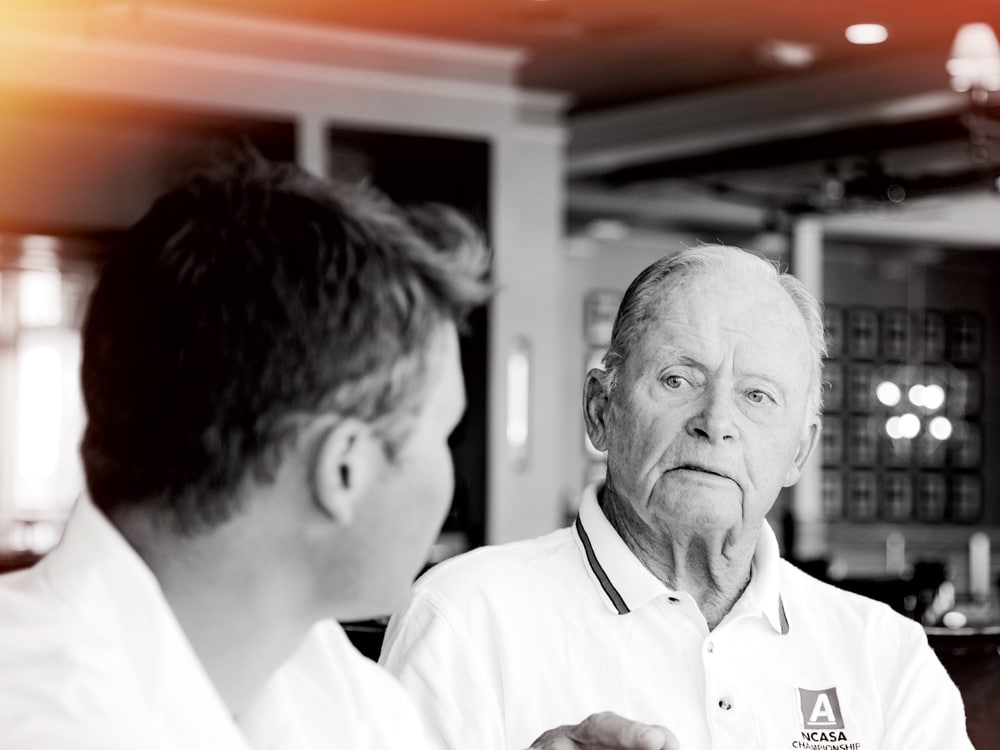
Harry: What do you remember most about either the trials or the Olympics?
Buddy: The Soling trials were in San Francisco, in the Berkeley Circle, and we were over early in the first race. But we clawed back and ended up fifth. That was all right, and it told us we had good speed. The next race, it’s really smokin’, and we go around the windward mark in first place, set the kite, and I’m not sure — maybe the backstay had unraveled or something — and boom! The mast breaks. We were in first place, and now we’re drifting down San Francisco Bay, getting a DNF. We go in, and darn if we don’t find a mast that meets Soling standards. We rig it up on our way and go back out there. We didn’t know it at the time, but we were faster than ever. We sort of stumbled through the first race with the new mast and still got a second, and then came back and won three in a row. That was the trials that took us to the games. It’s all about overcoming obstacles.
So, when we got to Germany, talk about feeling cocky. But you have to keep that within your own self, never verbalize it. But you feel it. When you feel you’re ready, it’s up here [pointing to his head]. It’s like, “OK, I’ve done everything I can possibly do,” and then you still run through the checklist — sails, rig, boat, hull form. Is it the best bottom finish that’s on the market? Stuff like that.
In Germany, we were so fast that we won the first race by seven and a half minutes. We just blew them away. We were using Triton X-100, which was a soap, on the bottom. It was completely legal. Our competitors had their people out, trying to find out what we were doing. And they did. So, if you think you’re going to pull the wool over somebody’s eyes, Harry, it ain’t gonna happen. I mean, everyone knows what you’re doing, they know how you’re doing it, and if you’ve got something going, they’re going to try to duplicate it or improve on it.
We had a one, two, three, four in the first races, then there were the Munich shootings, which put everything on hold. After that, we won the next race, and everything was in hand. We didn’t have to sail the last race, but we did anyway and won that. We were so relaxed and having fun: “Oh, look at that puff! I think we ought to tack, don’t you? OK, let’s tack.”
If you could sail every race with the attitude we had on that boat in that race, nobody would beat you.
Buddy: What does your coach help you with most?
Harry: At regattas, probably the biggest thing is being a tender boat, having food, water and everything while racing because we burn so many calories on the water. It’s really important to fuel up and hydrate, since we’re often doing seven hours a day, which is a lot. But the biggest thing, especially since we’re so new to the class, is that he takes a bunch of videos of us at events and of the top guys to really scope out what they’re doing differently and how we can match them and improve on what they’re doing. Whenever we’re with him, we improve a lot.
Buddy: That’s good because he is able to see the little things. There might be a new thing about where you put your left foot every time you start a tack, and in that boat, it seems like it’s critical to get that little extra shot you’re looking for coming out of a tack, because the boats probably lose more than a keelboat would on a tack. To be able to go in and come out fast without slamming the boat crossways on the water. Theoretically, a tack is in increments, squeezing, going through the eye of the wind, and then going down, and the same time, the sails are coming in and going out. As I said before, and always stress, the more time you spend in the boat, the less thinking has to go in about the boat, and all of a sudden, your mind is out in front of the boat and you’re always presenting it to Mother Nature, and when you do that properly, she’s good to you.
Here’s a general rule. When you go east, you find out who’s fast, and you go with him. And when you go west, you find out who’s fast, and then you go with him. And then, in both places, on the final leg, you try to beat his ass.
Dave Powlison traveled to Fontana, Wisconsin, to compete in the 2018 Melges 14 U.S. Nationals, where he recorded this fascinating intergenerational exchange inside the Buddy Melges Sailing Center. The younger Melges sailed away with the Melges 14 title after winning five of nine races in a fleet of 34 competitors. Look for Powlison’s account of the regatta in a future issue.

